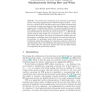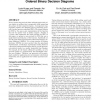120
click to vote
CORR
2011
Springer
14 years 9 months ago
2011
Springer
We examine the combination of two directions in the field of privacy concerning computations over distributed private inputs – secure function evaluation (SFE) and differential...
CRYPTO
2008
Springer
15 years 3 months ago
2008
Springer
We examine the combination of two directions in the field of privacy concerning computations over distributed private inputs
117
click to vote
EUROCRYPT
2000
Springer
15 years 5 months ago
2000
Springer
Sander, Young and Yung recently exhibited a protocol for computing on encrypted inputs, for functions computable in NC1 . In their variant of secure function evaluation, Bob (the &...
104
click to vote
EUROCRYPT
2006
Springer
15 years 5 months ago
2006
Springer
The standard security definition of unconditional secure function evaluation, which is based on the ideal/real model paradigm, has the disadvantage of being overly complicated to w...
121
click to vote
CCS
2006
ACM
15 years 5 months ago
2006
ACM
Privacy-preserving protocols allow multiple parties with private inputs to perform joint computation while preserving the privacy of their respective inputs. An important cryptogr...
PODC
2004
ACM
15 years 7 months ago
2004
ACM
Secure function evaluation (SFE) enables a group of players, by themselves, to evaluate a function on private inputs as securely as if a trusted third party had done it for them. ...
104
click to vote
FC
2005
Springer
15 years 7 months ago
2005
Springer
Abstract. Suppose Alice and Bob are two entities (e.g. agents, organizations, etc.) that wish to negotiate a contract. A contract consists of several clauses, and each party has ce...
103
click to vote
STOC
2002
ACM
16 years 2 months ago
2002
ACM
Secure multi-party computing, also called secure function evaluation, has been extensively studied in classical cryptography. We consider the extension of this task to computation...




